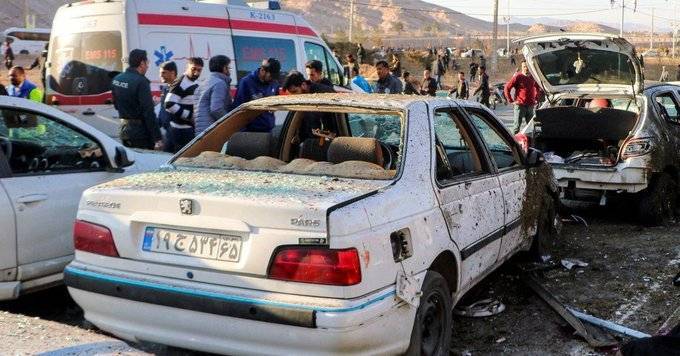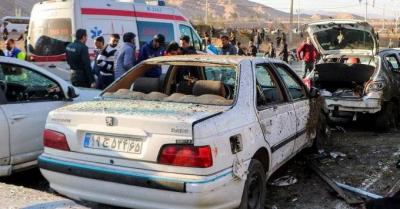The Iranian Revolutionary Guard and First Vice President Mohammad Mokhber vowed today, Thursday, to take revenge for the deaths of about 100 people and the injuring of dozens in two explosions at a cemetery during a commemoration of prominent Iranian commander Qassem Soleimani, who was killed in a U.S. drone strike in 2020. Mokhber told reporters at one of the hospitals where some of the wounded were receiving treatment from the deadliest attack since the Islamic Revolution in 1979, "They will face very strong revenge from Soleimani's soldiers." No group has claimed responsibility for the explosions. A senior official in the administration of U.S. President Joe Biden stated that the bombings seem to represent "a terrorist attack," of the type previously executed by fighters of ISIS.
The Islamic Revolutionary Guard described Wednesday's attack as a cowardly act "aimed at spreading insecurity and seeking revenge for the nation's deep love and loyalty to the Islamic Republic." The Guard also stated that the attack "strengthens the resolve to decisively and justly punish the perpetrators." The commander of the Revolutionary Guard in Kerman province denied reports from official media about gunfire in the city today. Iranian President Ebrahim Raisi condemned the "atrocious and inhumane crime," and Iranian Supreme Leader Ayatollah Khamenei pledged to exact revenge for what occurred in the bombings. Iranian Red Crescent rescue workers attended to those injured during the commemoration of Soleimani's death.
**Previous Attacks**
Tehran has long accused its arch-enemies, Israel and the United States, of supporting armed groups hostile to Iran. In 2022, ISIS claimed responsibility for an attack on a Shiite shrine in Iran that resulted in the deaths of 15 people. Previous attacks claimed by the group included deadly twin bombings in 2017 that targeted the Iranian parliament and the mausoleum of the founder of the Islamic Republic, Ayatollah Ruhollah Khomeini. There have also been attacks by armed Baluch militants and Arab separatists in Iran.
The U.S. assassination of Soleimani on January 3, 2020, via a drone strike in Baghdad, and Iran's retaliation by attacking two Iraqi military bases hosting U.S. forces, brought the U.S. and Iran closer to a comprehensive conflict. As the commander of the Quds Force, the external arm of the Revolutionary Guard, Soleimani managed covert operations abroad and was a key figure in Iran's long-term campaign to expel U.S. forces from the Middle East.
Tensions between Iran and Israel, along with its ally the United States, reached new heights due to Israel's war with Iranian-backed "Hamas" fighters in Gaza following the October 7 attack. The Iranian-aligned Houthi group in Yemen attacked ships it claimed were linked to Israel at the entrance of the Red Sea, one of the world's busiest shipping routes. U.S. forces have been attacked by Iran-aligned militants in Iraq and Syria, due to Washington's support for Israel, and have responded with retaliatory airstrikes.




